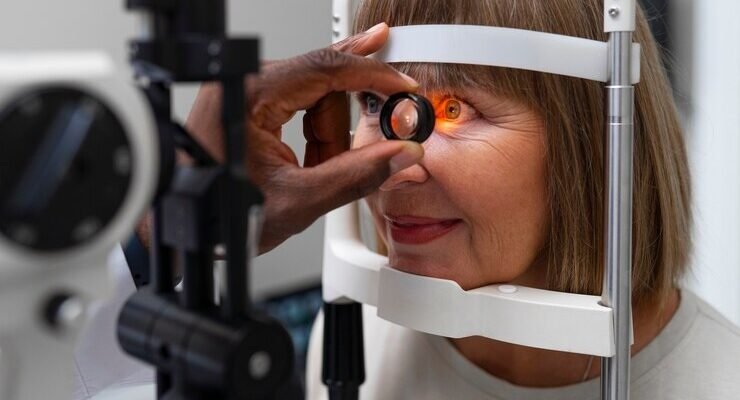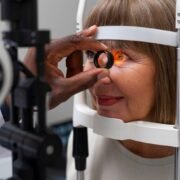What are the Benefits of Regular Eye Exams?
Your eyes are the windows to your soul, but did you know they’re also windows to your overall health? Many folks think eye exams are just for updating glasses prescriptions, but they offer a whole lot more. Let’s peek behind the curtain and discover the surprising benefits of regular eye exams that go way beyond 20/20 vision.
Regular comprehensive eye exams aren’t just about checking your eyesight – they’re crucial for detecting various eye diseases, monitoring overall health, and maintaining a lifetime of clear, comfortable vision.
Key Takeaways
- Early detection of eye diseases like glaucoma, cataracts, and macular degeneration through regular exams
- Eyes can reveal signs of serious health conditions like diabetes, high blood pressure, and high cholesterol
- Up-to-date prescriptions prevent eye strain, headaches and ensure optimal vision for all activities
- Exams preserve vision at every age, from childhood development to maintaining senior independence
- Following recommended exam frequency (kids: annually, adults: 1-2 years, seniors: annually) is vital
Let’s face it, most of us dread going to the eye doctor. The bright lights, those dreaded puffs of air, and having to answer a million “which is better, 1 or 2?” questions. But skipping those regular comprehensive eye exams? That’s just playing a dangerous game of eye-health roulette.
Early Detection of Eye Diseases
Here’s the hard truth – many vision-threatening eye diseases show no symptoms until they’re advanced and causing permanent damage. Talk about a sneak attack! The good news? Regular eye exams allow your optometrist to be like a sneaky ninja, catching those diseases early before they can really mess with your sight.
- Glaucoma
- Cataracts
- Macular degeneration
- Diabetic retinopathy
By dilating your pupils and peering into the back of your eyes, your doc can spot the first subtle signs of these silent sight-stealers. And catching them in those early, treatable stages? That’s how you keep your eyes healthy and vision crystal clear for years to come.
Monitoring Overall Health
Wait, what? Your eye doc can detect other health issues just by looking into your eyes? You bet! Those tiny blood vessels and structures in your peepers are like tiny windows, giving your optometrist a sneak peek at what’s going on in the rest of your body.
| Health Conditions Detectable | Signs in the Eyes |
|---|---|
| Diabetes | Leaking blood vessels, swelling |
| High Blood Pressure | Narrow blood vessels, hemorrhages |
| High Cholesterol | Plaque buildup in blood vessels |
See, those basic vision screenings at the mall or school only check if you can read an eye chart. But a comprehensive eye exam by a licensed optometrist? That’s an inside look at your overall health, not just your eyesight.
Just ask Michelle from Ohio, whose optometrist noticed swollen optic nerves during a routine exam. After further testing, it turns out Michelle had a brain tumor – caught early thanks to those eagle eyes!
Updating Prescriptions
Okay, you can’t see price tags or road signs clearly anymore. No biggie, just update those glasses or contact lenses, right? Well, sort of. Outdated prescriptions are more than just an inconvenience – they can lead to headaches, eye strain, and blurry vision that impacts your daily life.
Imagine trying to read books, work on the computer, or drive with the wrong prescription glasses or contacts. Not exactly a safe or enjoyable experience! That’s why getting your eyes checked regularly is so important – your prescription often changes before you even notice those subtle vision shifts.
By keeping up with your exams, your optometrist ensures you always have an accurate, up-to-date prescription. That means no more eye strain from squinting at the TV, and no more migraines from staring at a blurry computer screen. Just clear, comfortable, effortless vision for all your activities!
Preserving Vision for All Ages
Speaking of activities, did you know regular eye exams are crucial at every single stage of life? That’s right – babies, kids, adults, and seniors all need to get their peepers checked to preserve healthy vision.
For kids, comprehensive eye exams are essential for proper visual development which impacts learning abilities, hand-eye coordination, and more. Undetected vision problems in childhood can lead to permanent vision impairment or lazy eye. No parent wants that for their kiddo!
And as we age into adulthood, keeping up with exams ensures our vision stays on point for work, hobbies, and all our daily to-dos. After age 40, our risk for developing vision-robbing conditions like glaucoma, cataracts, and macular degeneration skyrockets.
For seniors, sticking to those annual exam recommendations helps maintain independence, mobility, and quality of life as age-related eye diseases become more common. Nobody wants to struggle with reading, driving, or recognizing loved ones’ faces due to declining vision.
Preventing Eye Strain
In today’s digital world, we’re all spending way more time staring at screens than ever before. And you know what that leads to? Eye strain, my friends. Burning, itchy, tired eyes that feel like you just binge-watched a whole season in one sitting (been there!).
During your comprehensive eye exam, your optometrist can evaluate how well your eyes are holding up against all that digital device use. They’ll check for signs of eye strain, dry eyes, and other digitally-induced issues and provide tips to alleviate symptoms.
Simple things like following the 20-20-20 rule (every 20 mins, look 20 feet away for 20 secs), adjusting screen brightness, and using anti-glare screens or glasses coatings can have a huge impact. Your optometrist is like an eye trainer, coaching you through ergonomic improvements to make all that screen time more comfortable.
Frequency of Eye Exams by Age
Okay, so we’ve covered why regular eye exams are so crucial. But how often should you really be going to the optometrist’s office? Well, the recommendation frequency depends on your age:
Children (Ages 3-18) Time for an annual exam, no exceptions! Developing eyes need to be checked yearly to ensure proper vision and catch any issues early before they cause permanent problems.
Adults (Ages 19-60) For most adults with no existing eye conditions, an exam every 1-2 years is recommended to screen for age-related changes and update prescriptions as needed.
Seniors (Ages 61+) It’s annual exam time again! Seniors are at highest risk for vision-robbing diseases like glaucoma, cataracts, and macular degeneration. Yearly checks are a must.
Of course, anyone with existing eye conditions or risk factors like diabetes may need even more frequent monitoring based on their optometrist’s recommendation. When it comes to your eyesight, it’s always better to err on the side of caution!
Conclusion
There you have it, folks – comprehensive eye exams truly are a fountain of youth for your precious peepers. From detecting silent, blinding diseases to monitoring your overall health to preventing vision loss at every age, those appointments are so much more than just an inconvenience.
By sticking to the recommended exam schedule for your age, you’re not just preserving your eyesight. You’re investing in a lifetime of clear, comfortable vision and independence. Plus, who doesn’t want their doc to have an inside scoop on their health?
Look, I get it – going to the optometrist probably ranks right up there with doing taxes and going to the DMV on your fun-o-meter. But remember, those docs aren’t just fancy eyeglass peddlers. They’re medically trained experts at peering deep into your eyes to uncover all kinds of secrets about your overall well-being.
So go ahead, make that appointment with your optometrist today. Your eyes, and the rest of your body, will thank you! Regular eye exams are a simple step that could just save your sight and health in the long run. Don’t leave your vision – or well-being – to chance. Keeping up with those exams? Now that’s true 20/20 foresight!











